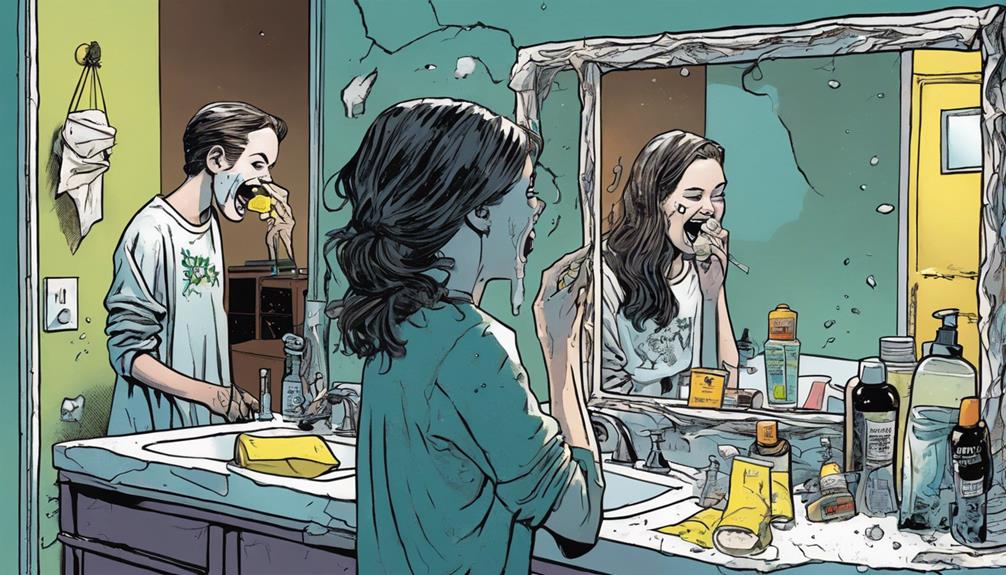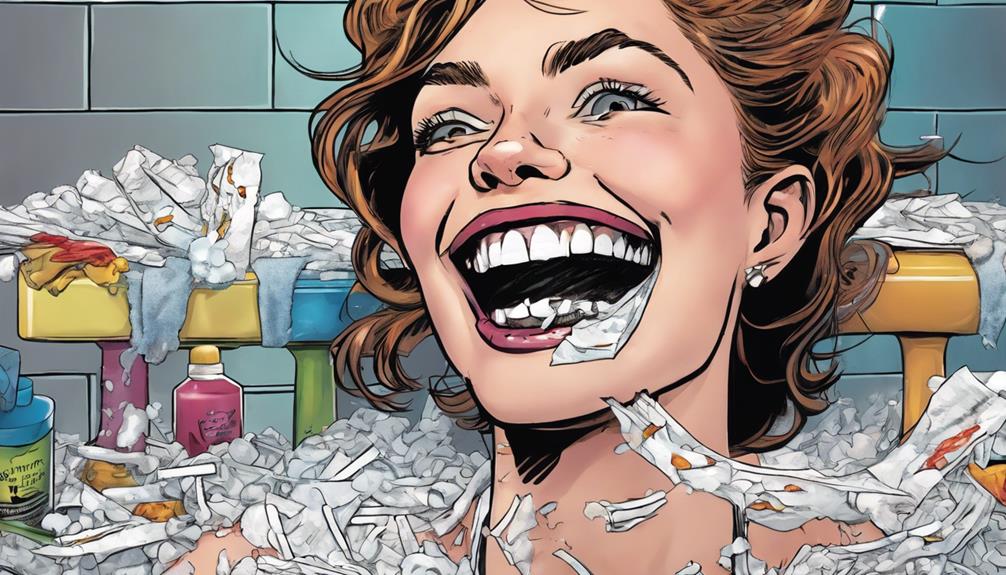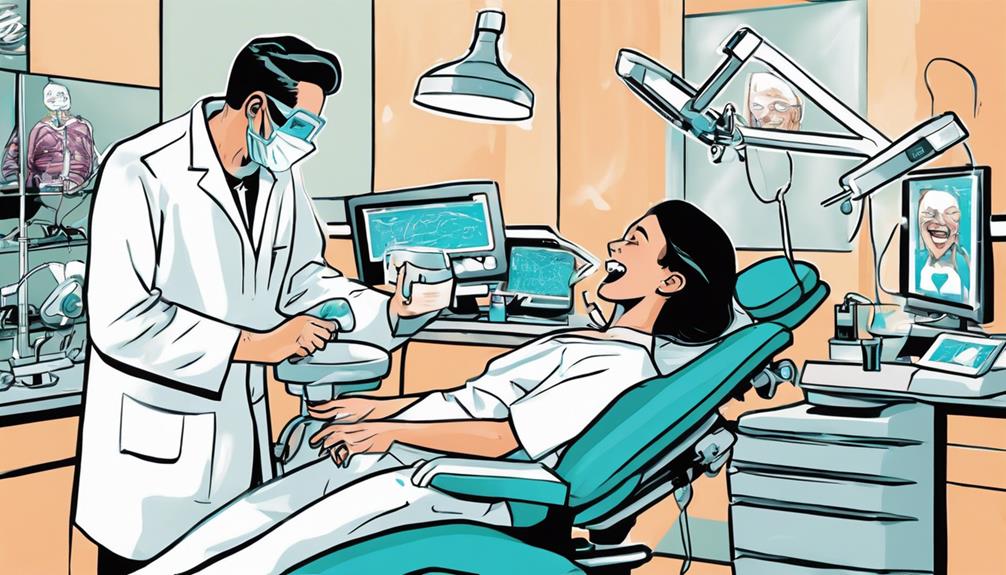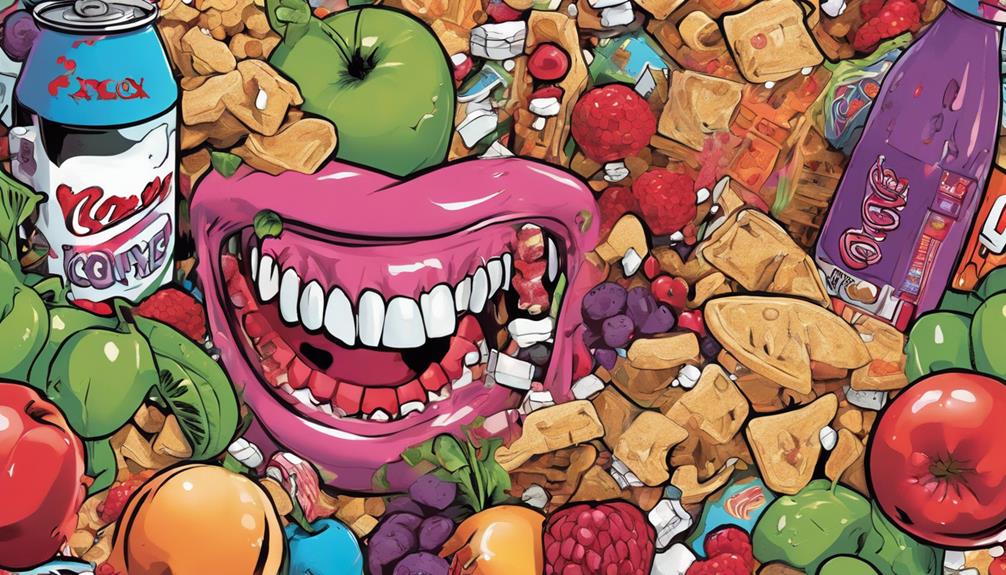You should avoid popular teeth whitening fads because they can harm your dental health. Many DIY methods use harmful ingredients like activated charcoal and lemon juice, which erode enamel and increase sensitivity. Influencers often promote unverified hacks that lack scientific backing and can lead to serious complications. Additionally, risky practices like tooth filing or using rubber bands can cause permanent damage. Professional whitening, on the other hand, is safe and effective. If you want to keep your smile bright without risking your teeth, understanding these trends' dangers is essential for your oral health. There's more to uncover about safe practices.
Key Takeaways
- DIY teeth whitening methods often use harmful ingredients like activated charcoal and lemon juice, which can erode enamel and cause sensitivity.
- Many viral whitening trends lack scientific evidence and can lead to dental emergencies or complications.
- Unsafe practices, such as tooth filing and at-home mouth piercings, risk irreversible damage and infections.
- Relying on unqualified sources for dental care increases the likelihood of ineffective or dangerous treatments.
Dangerous DIY Dental Trends

When it comes to DIY dental trends, you should be cautious, as many popular methods can seriously harm your teeth and gums.
One prevalent method is DIY teeth whitening, which often involves ingredients like apple cider vinegar and baking soda. While they might seem harmless, they can actually damage the enamel, leading to increased sensitivity and other oral health issues. Using these acidic substances repeatedly erodes your enamel, making your teeth more susceptible to decay.
Another risky practice is tooth filing. Attempting to smooth out imperfections with a nail file might sound simple, but it can result in irreversible damage to your enamel and expose the dentin. This increases your risk of cavities and complicates future dental care.
Additionally, at-home mouth piercings pose significant dangers, including infections and nerve damage, especially when done in non-sterile environments.
Lastly, using rubber bands to close gaps in your teeth isn't only uncomfortable but also dangerous for your oral health. This method can lead to misalignment and orthodontic relapse.
Always consult a professional before trying any DIY dental trend to protect your well-being.
Misleading Social Media Practices

When you scroll through social media, you might come across viral teeth whitening hacks that promise quick results.
However, many of these methods lack scientific backing and can actually harm your teeth.
It's essential to be cautious about what you see online and to prioritize safety over trends.
Viral Misinformation Risks
Social media's allure can easily lead you down a path of misleading teeth whitening practices that pose serious risks to your dental health. Viral misinformation spreads quickly, especially on platforms like TikTok, where DIY whitening trends gain traction. You might feel tempted to try various teeth whitening products promoted by influencers, but many of these methods are unverified and potentially harmful.
Engaging in DIY whitening can result in significant enamel erosion and increased gum sensitivity. Without professional guidance, you may adopt unsafe habits that could worsen existing dental issues. It's crucial to recognize that just because a trend goes viral doesn't mean it's safe or effective.
The influence of social media can mislead you into believing these unverified practices are harmless. Always prioritize your oral health by seeking information from credible sources.
Before trying any new whitening method, consider consulting a dental professional who can provide tailored advice based on your unique needs. Staying informed helps you avoid the pitfalls of misleading dental trends and protects your smile from unnecessary harm.
Lack of Scientific Evidence
Many trendy teeth whitening methods lack scientific evidence, leaving you vulnerable to ineffective and potentially harmful practices. Social media influencers often promote DIY techniques like activated charcoal or lemon juice, but these can damage your tooth enamel and lead to gum sensitivity. The American Dental Association (ADA) warns against these methods, stating they lack sufficient proof of safety and effectiveness.
Here's a quick comparison of common teeth whitening methods:
| Method | Safety | Effectiveness |
|---|---|---|
| Activated Charcoal | Potentially harmful | Not scientifically proven |
| Lemon Juice | Erosive to enamel | Ineffective for whitening |
| Professional Whitening | Safe and effective | Proven results with controlled ingredients |
When you rely on viral trends instead of evidence-based practices, you risk wasting time and money on treatments that don't work. Remember, the ADA doesn't endorse many popular DIY methods due to their potential risks. Prioritize your dental health by sticking to professional treatments that are scientifically validated, ensuring your smile stays bright without compromising your tooth enamel.
Unsafe DIY Whitening Methods
Misleading social media practices promote unsafe DIY whitening methods that can seriously harm your dental health. Many influencers share quick-fix teeth whitening hacks that lack scientific backing, leading you to try harmful routines.
Here are four reasons to avoid these methods:
- Enamel Erosion: Ingredients like activated charcoal and lemon juice can erode your enamel, making teeth more vulnerable to stains and decay.
- Increased Sensitivity: Unsafe DIY whitening methods often lead to heightened tooth sensitivity, causing discomfort with hot or cold foods.
- Dissatisfaction: Many people find that DIY results fall short, prompting repeated attempts that further damage their teeth.
- Lack of Professional Oversight: Unlike professional teeth whitening, which is tailored to your dental care needs, DIY methods can exacerbate existing problems.
Investing in professional teeth whitening treatments guarantees you receive safe, effective care from qualified dentists. They use methods designed for your specific needs, minimizing risks associated with popular fads.
Prioritize your dental health by steering clear of unsafe DIY whitening methods and opting for professional help.
Risks of Common Whitening Methods

Common DIY whitening methods often pose serious risks to your dental health, leading to long-term damage and increased sensitivity.
Many people turn to ingredients like hydrogen peroxide and activated charcoal, believing they're safe options for teeth whitening. However, excessive rinsing with hydrogen peroxide can irritate your gums and damage enamel, especially when using high concentrations found in some DIY recipes.
Activated charcoal is another popular choice, but it can wear away your enamel over time, making your teeth more vulnerable to yellowing and tooth decay. Using abrasive substances, such as lemon juice and baking soda, may seem harmless, but their acidic nature can erode your enamel, creating sensitivity and potential long-term damage.
Moreover, relying on misleading social media trends often leads to ineffective whitening hacks that don't address the real issues behind discoloration.
Instead of risking your dental health with these methods, consider seeking professional whitening treatments. Qualified dentists can provide tailored solutions designed to minimize risks while effectively brightening your smile.
Cosmetic Dental Trends to Avoid

When it comes to cosmetic dental trends, you should be cautious about harmful DIY methods that can damage your teeth.
Misleading social media trends often promote unsafe practices that lack scientific support, putting your oral health at risk.
Additionally, unprofessional treatments can lead to serious complications, so it's best to stick to proven methods under professional guidance.
Harmful DIY Methods
Many DIY teeth whitening methods, often touted as miracle solutions, can actually harm your dental health instead of enhancing it. While it might be tempting to try these popular whitening trends, you should be aware of the risks involved.
Here are four harmful practices to avoid:
- Activated Charcoal: This can erode your tooth enamel over time, increasing sensitivity and potential damage.
- Lemon Juice and Baking Soda: This combination is acidic and abrasive, weakening enamel and possibly worsening discoloration.
- Excessive Hydrogen Peroxide: Using this as a mouth rinse can irritate your gums and damage enamel, especially in high concentrations or without professional advice.
- Unverified Social Media Hacks: Many DIY teeth whitening remedies lack scientific backing, leading to dissatisfaction and unsafe attempts at whitening.
Instead of risking your dental health, it's best to consult with your dentist for safe and effective teeth whitening options.
Misleading Social Media Trends
Social media trends often promote cosmetic dental hacks that can mislead you into choosing unsafe whitening methods. Many DIY teeth whitening techniques, like using activated charcoal or lemon juice, seem appealing but can actually erode your enamel and lead to long-term damage.
Despite what social media influencers may claim, these methods often lack scientific backing and can leave you dissatisfied with your natural teeth. The American Dental Association doesn't endorse oil pulling as a reliable whitening method, highlighting the risks involved.
Misleading trends frequently advocate unsafe practices that can cause gum irritation and ineffective results, especially when unqualified individuals attempt these procedures. Relying on these popular hacks increases your chances of experiencing a dental emergency.
It's vital to remember that professional guidance is essential for achieving safe and effective teeth whitening. Instead of following questionable social media trends, consider consulting a dental professional who can recommend evidence-based treatments tailored to your needs.
Prioritize your oral health by steering clear of fads that could jeopardize your smile.
Risks of Unprofessional Treatments
Unprofessional teeth whitening treatments can lead to significant risks, including uneven results and potential damage to your gums and oral tissues. Many people turn to DIY methods, unaware of the dangers they pose.
Here are four risks you should consider before trying unprofessional treatments:
- Enamel Erosion: Ingredients like charcoal and lemon juice can wear down your tooth enamel, increasing sensitivity and risking long-term damage.
- Uneven Results: Without proper equipment and expertise, you may end up with patchy whitening that looks unnatural.
- Chemical Burns: Using highly concentrated whitening agents without guidance can lead to serious burns and complications in your mouth.
- Misleading Information: Social media often promotes dangerous hacks that can worsen your dental issues instead of solving them.
It's essential to consult with a qualified dental practice for safe and effective solutions to whiten your teeth.
Importance of Professional Care

Professional care in teeth whitening guarantees that your unique staining issues are addressed safely and effectively, tailored specifically to your needs. When you consult a dental professional, you get a customized treatment plan using ADA-approved products designed to minimize risks like gum irritation and enamel damage. Here's a quick comparison of DIY versus professional whitening:
| Aspect | DIY Whitening |
|---|---|
| Safety | Higher risk of irritation/damage |
| Customization | One-size-fits-all |
| Supervision | No professional guidance |
| Long-term Results | Unpredictable |
| Professional Products | Often unregulated |
Regular dental check-ups allow your dentist to identify underlying issues that may cause discoloration, ensuring a thorough approach to your oral health. Expert supervision during professional whitening minimizes adverse effects since trained professionals understand the right concentrations and methods to use. Ultimately, consulting with a dentist before any whitening procedure not only prioritizes your immediate aesthetics but also your long-term oral health. Choose professional care to achieve safe, effective, and lasting results in teeth whitening.
Community Health Awareness

Community health awareness campaigns play an essential role in educating you about the risks of misleading DIY teeth whitening trends that can harm your oral health. These initiatives often partner with dental professionals to provide valuable information on safe practices.
Here are four key points to evaluate regarding teeth whitening and community health awareness:
- Consult a Dentist: Always seek advice from a qualified dentist before trying any whitening method. They can recommend safer alternatives tailored to your needs.
- Educational Resources: Local organizations often distribute materials highlighting the dangers of popular whitening fads, helping you make informed choices.
- Focus on Regular Check-Ups: Engaging in routine dental visits can prevent the temptation of unsafe whitening techniques and promote overall oral health.
- Engagement with Families: Programs aimed at children and families stress the importance of good dental hygiene, laying the groundwork for future oral health habits.
Frequently Asked Questions
Why Is Teeth Whitening Not Recommended?
Teeth whitening isn't recommended because many methods can damage enamel or irritate gums. You might not achieve the desired results, and underlying dental issues often need professional evaluation instead of relying on risky DIY solutions.
Why Dentists Don T Recommend Whitening Toothpaste?
Whitening toothpaste can feel like a tempting mirage, but dentists don't recommend it because it often lacks efficacy and can harm your enamel. They suggest professional treatments instead, ensuring your smile shines safely and effectively.
Is White Glo Bad for Your Teeth?
Yes, White Glo can be bad for your teeth. Its abrasive ingredients may erode enamel, increasing sensitivity and decay risks. High hydrogen peroxide levels can irritate gums, so it's best to consult your dentist first.
What Teeth Whitening Hack Should You Avoid?
You should avoid using activated charcoal for teeth whitening. It's abrasive and can erode your enamel, leading to more yellowing instead of the bright smile you're aiming for. Stick to safer, professional options for effective results.
What Are the Potential Risks of Popular Teeth Whitening Fads?
Many popular teeth whitening fads come with potential side effects of whitening kits such as increased tooth sensitivity, gum irritation, and damage to the tooth enamel. It’s important to consult with a dentist before trying any new whitening products to avoid potential risks and ensure safety for your teeth.
Conclusion
In a world where dazzling smiles are just a trend away, don't let the allure of quick fixes blind you.
Popular teeth whitening fads can be like a double-edged sword, promising brilliance but often delivering disaster. While many people are drawn to the appeal of achieving a brighter smile, it’s important to weigh the risks of teeth whitening. Some popular DIY methods can lead to irreversible damage to the enamel and heightened tooth sensitivity. Professional whitening treatments also come with their own set of risks, such as potential gum irritation and uneven color results. It’s crucial to consult with a dentist before embarking on any teeth whitening journey to ensure the safest and most effective approach.
Remember, your smile is precious—treat it with the care it deserves.
Instead of diving into risky methods, seek professional guidance, and let your pearly whites shine safely and healthily.
After all, a true smile sparkles from within!









